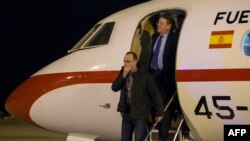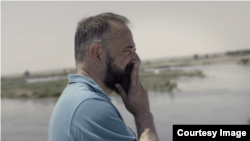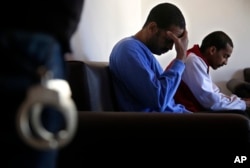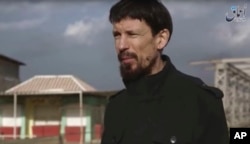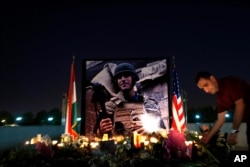Standing in the place where Islamic State militants held him hostage, Marc Marginedas was visibly moved.
"Who would have thought I would be back here?" the veteran war correspondent said.
Coalition bombing has leveled the building. But standing on the broken tiled floor, Marginedas could look out over the Euphrates; a river that he and other hostages had viewed from their cell.
These are the closing shots of Return to Raqqa, a documentary about the Spanish journalist and others held hostage by Islamic State militants.
Marginedas was held for nearly six months in Syria between September 2013 and March 2014, along with other Western journalists and aid workers — 26 in total, nearly all of them journalists.
Almost 10 years later, the documentary, which is showing on the Spanish Movistar streaming service, recounts their harrowing treatment at the hands of militants, in particular a brutal cell nicknamed "The Beatles" because of their English accents.
The documentary has been viewed at festivals in Spain and France with a goal of showing it in other countries.
Marginedas knows war. He covered the Arab Spring anti-government protests and was on his third reporting trip to cover Syria's civil war when he was abducted.
He says he views the kidnapping as part of the risk of his job, which involves covering Russia and the Arab world for Spanish newspaper El Periodico de Catalunya.
"It wasn't that big a deal to tell you a truth. Because of my job, I have been exposed to violence. It is not a trauma," he told VOA in an interview.
"[Being kidnapped] is more of a job accident. It is like someone who cuts wood and cuts their finger. You are prepared for that. [But] if you are a mayor and you are kidnapped by ETA that is a shock," he said, referring to the Basque separatist organization.
Still, Marginedas acknowledges that journalists — including those in Russia where he has also worked — are a target.
"We are very juicy for militia and for Russia. I think it is good we have more protection. We need to understand the challenges," said Marginedas, a special correspondent covering Russia and Ukraine.
"Russia is a country which is run by a mafia mob and is perfectly fine with hostage taking. There is not much difference between Russia and Islamic State."
Russia is currently detaining The Wall Street Journal reporter Evan Gershkovich on accusations of espionage. The U.S. says the American journalist is "wrongfully detained" and Gershkovich's paper has denied the charges.
Marginedas's decision to return to reporting is partly the inspiration for Return to Raqqa.
Albert Sole, the film's producer, told VOA part of the reason he decided to make the documentary was to "pay homage to the bravery of his journalism."
"I know Marc [from] when we started in journalism," Sole said, adding, "I also wanted to make a work about Islamic State, knowing that there was huge interest in this subject around the world."
Connections
Marginedas is still in touch with many of the other hostages and the relatives of those who did not make it back.
"We are a small family. Our paths would never have crossed [otherwise]," he said.
Some of them reunited last year when one of their captors, El Shafee Elsheikh, appeared in a U.S. federal court in Alexandria, Virginia.
The court convicted Elsheikh, who was raised in London, of conspiring to kill four American hostages: James Foley, Steven Sotloff, Peter Kassig, and Kayla Mueller. He is serving a life sentence.
During the trial, said Marginedas, he realized some relatives were starting to recover from their loss.
"People start to heal," he said. "For [Kayla's family] the trial helped heal the pain."
Marginedas said that Foley's mother, Diane, had met last year with Alexanda Kotey, another of the so-called "The Beatles."
"She is very brave woman. She is a strong Catholic. She believes that forgiveness is important," he said.
Kotey was sentenced to life in prison by a U.S. judge in 2022. He pleaded guilty last September to the murders of Foley, Sotloff, Kassig and Mueller.
A third member of the group, Mohammed Emwazi, died in a U.S.-British missile strike in Syria in 2015.
Marginedas did not want to speculate on the fate of John Cantlie, a British photojournalist kidnapped in Syria alongside Foley and now presumed dead.
After releasing videos of them killing their hostages, the militants also published online several videos of Cantlie.
"I was very close to John. We slept side by side," he said. "My best friend was Steven [Sotloff] and [Cantlie] and Foley. John was the most intelligent one. He understood the mentality of our captors," he said.
Marginedas spoke dearly of Sotloff, describing him as the "bravest" among the hostages because as a Jewish American he was most at risk.
"James [Foley] was the most popular. He was very simple and very humble," Marginedas remembered.
As the first hostage to be released in March 2014, Marginedas said the sudden focus of the world's attention was "intimidating."
"Two days after being released, I had [met] the parents of Foley and other relatives. I was briefing them on the whereabouts of their relatives," he said.
He opened his computer to find cash offers for interviews from around the world. It was too much.
Marginedas underwent treatment for a year but does not believe he suffered post-traumatic stress disorder — a condition he had after covering the Algerian civil war in 1998.
He threw himself back into work, but soon realized he was struggling. While on assignment in Ukraine covering the downing of a Malaysia Airlines plane in 2014, he panicked when he thought he was going to be arrested.
In some cases, former hostages like Javier Espinosa, a correspondent for the Spanish newspaper El Mundo, met their former captors years later.
Another Spanish journalist, Ricardo García Vilanova, returned to Syria to report on the civil war. If he had been kidnapped again, it would have been very difficult for him, Marginedas said.
Is this a foolhardy way to deal with being kidnapped? Marginedas believes not.
"I think it is a perfectly fine way of dealing with what we went through," said Marginedas. "Everything that happened needs to be revealed."




